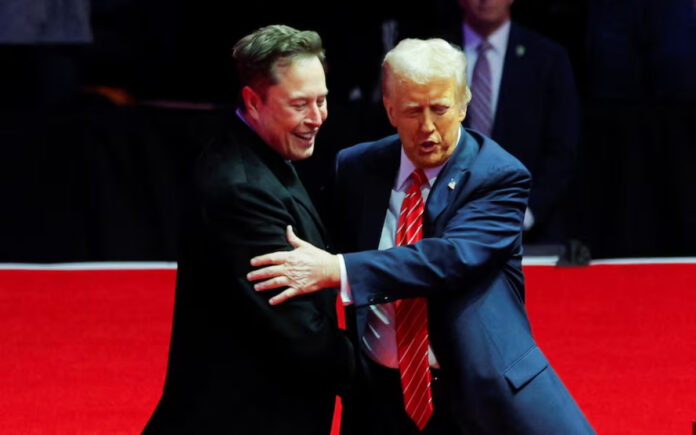Washington: President Donald Trump signed an executive order on Monday establishing the Department of Government Efficiency, commonly referred to as “DOGE”, an advisory group aimed at implementing sweeping cuts to the federal government. The announcement has already triggered lawsuits challenging the group’s legality and proposed operations.
The advisory group, led by Tesla CEO Elon Musk, has ambitious goals, including eliminating entire federal agencies and reducing federal government jobs by 75%. A White House statement revealed that the group’s primary mission is to “modernize federal technology and software.”
Failed Republican presidential candidate Vivek Ramaswamy initially served as a co-chair but has since stepped down to pursue a gubernatorial bid in Ohio. Trump spokesperson Anna Kelly confirmed Ramaswamy’s departure, while a source familiar with his plans stated he is preparing for the state election.
Grand Ambitions and Immediate Backlash
During his inaugural address, Trump declared, “To restore competence and effectiveness to our federal government, my administration will establish the brand-new Department of Government Efficiency.” He later told reporters that DOGE plans to hire about 20 individuals to oversee its objectives.
Despite its high-profile leadership and ambitious goals, DOGE is not officially recognized as a government department and holds limited authority to implement its proposed reforms. The announcement sparked an immediate wave of lawsuits from government employee unions, watchdog organizations, and public interest groups.
National Security Counselors, a watchdog organization, alleged that DOGE violates the 1972 Federal Advisory Committee Act, which governs the operation of such committees. Other groups, including the American Public Health Association, the American Federation of Teachers, and Citizens for Responsibility and Ethics in Washington (CREW), have filed similar lawsuits.
Public Citizen, another advocacy group, also filed a lawsuit, raising concerns over DOGE’s ambiguous legal status. Additionally, a union representing federal employees joined the legal challenge, questioning the group’s authority and transparency.
Also Read | What Happens When a President Doesn’t Swear on a Bible? Trump’s Case
Historical Precedent of Limited Impact
Advisory committees aimed at reducing government inefficiencies are not new but have historically struggled to achieve significant results. In 1982, President Ronald Reagan introduced a similar initiative, which comprised private-sector experts to review executive branch spending. However, the committee delivered its report 18 months late, and most of its recommendations were never implemented.
Also Read | Greenland’s Geopolitical Value: Trump Pushes for U.S. Acquisition
Neither Tesla nor the White House’s Office of Management and Budget, named as defendants in the lawsuits, have responded to requests for comment regarding DOGE’s operations and legal standing.
Also Read | Trump Pardons 1,500 Jan. 6 Defendants After Reclaiming Presidency
As lawsuits mount, the future of DOGE remains uncertain. Critics argue that the group’s bold vision lacks a clear legal framework and realistic path for implementation, while supporters maintain that it represents a much-needed push to modernize and streamline federal operations.



